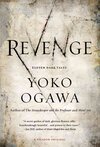Yoko Ogawa
(translated by Stephen Snyder)

As a rule, I've decided generally not to cover short story compilations (a decision I came to after reading Haruki Murakami's The Elephant Vanishes) on the basis that there's often a lot more difficulty analysing and writing about them as a unified piece of work.
Having read Yoko Ogawa's Revenge (subtitled 'Eleven Dark Tales'), I'm unsure as to whether or not I can confidently describe it as a short story compilation. Though the said tales are all self-contained to some extent, a major characteristic of Revenge is how all the stories are linked in a number of ways.
The more overt, surface connections between stories are very skilfully incorporated, in my view. Rather than opting for making these short vignettes explicitly the sum of a larger, singular piece; Ogawa connects them more in order to illustrate how the insular lives lived by their protagonists can subtly impact on one another (events in the background of one story will be central or, at least, extended upon in a later story), and, through this, she is able to paint detailed portraits of her characters and settings without compromising the Kafka-esque minimalism of her writing style.
Backing this sense of connectivity up further is a strong thematic consistency. Broadly speaking, each story examines the strange darkness that lies just beneath everyday lives and interactions (she has warranted much comparison with David Lynch in this regard); something that is effectively presented, for example, in 'The Museum of Torture''s examination of how violence manifests itself within the everyday. The titular museum displays used implements of torture and violence alongside the completely ordinary artefacts of an otherwise normal, everyday, functioning home. As well as this, we follow the story's first-person narrator's growing feelings of anger towards her boyfriend as they spiral into contemplations of violence.
For all their dwelling on the strange, dark, and uncomfortable aspects of real life; Revenge's 11 vignettes are very accessible and - along with some short stories published in The New Yorker(equally fascinating and similarly evocative of a strange sort of eerie calm) - have made me want to explore more of Yoko Ogawa's work and, furthermore, to expand my knowledge of Japanese literature.